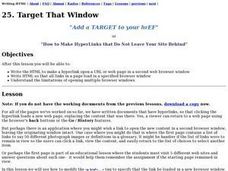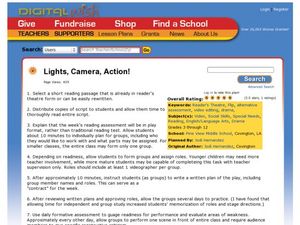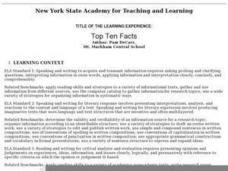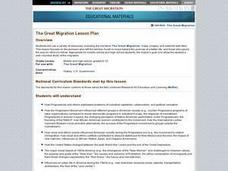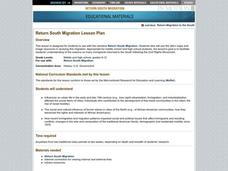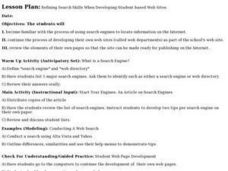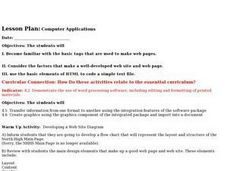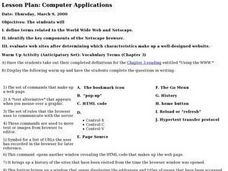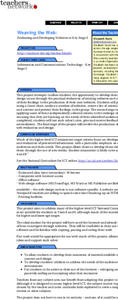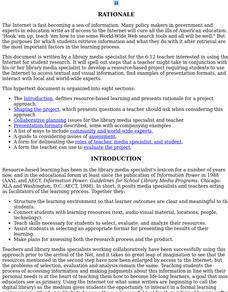Curated OER
META tags
Learners write HTML to have one web page automatically advance to another page. They add embedded information that help others find their web site using Internet searches.
Curated OER
Target That Window
Learners write HTML to make hyperlink open a URL or web page in a second web browser window. They write HTML so that all links in a page load in a specific browswer window.
Curated OER
Lights, Camera, Action!
Students add various types of multimedia to a website they have created about volcanoes. They review what would best enhance their website and determine what the value and cost be in adding that particular piece of multimedia.
Curated OER
Top Ten Facts
Students, in pairs, complete research about an assigned person. One student does research in the library and the other on the Internet. They come back together, compare their research, and compile a list of 10 main facts about their person.
Curated OER
Evaluating General Web Search Tools: Which are Best?
Learners develop a topic statement or research question. They examine the best use of search engines and directories to effectively retrieve good information.
Curated OER
General Web Search Tools: An Introduction
Students study the three major web search tools: search engines, directories, and metasearch engines. They examine the appropriate times to use each of the search tools.
Curated OER
Choosing the Best Hits
Young scholars practice quickly scanning the results of an internet search to determine which might provide the best information. They choose key words or phrases to type into the search engine and read the descriptions of each hit.
Curated OER
Cyberspace
Learners create original works of art or music and upload them to the Internet. They work individually or in a group. Then they collaborate with others to interpret, analyze, or alter the work.
Curated OER
Recovering Under-examined Histories to Build Community
Students read Diane Glancy's "Pushing the Bear" about the Cherokee Removal and respond online to a discussion board. They discuss responses in class.
Curated OER
Philadelphia's Important Contribution to the Lewis and Clark Expedition
Learners analyze a primary source document (Jefferson's secret letter to Congress) and identify its objectives through the aid of focus questions. They complete a graphic organizer and write an article summarizing Philadelphia's...
Curated OER
The Great Migration Lesson Plan
Students read a narrative "The Great Migration." They answer specific questions that check for understanding of the text. They discuss reasons for migrating. They choose an African-American hero/athlete to research online. They share...
Curated OER
Return South Migration Lesson Plan
Students read the narrative "Return South Migration" and research online about the reasons many southerners returned to the south following the Civil Rights Movement. They write a letter to a friend about their decision whether or not to...
Curated OER
Not the Stereotypical Immigrant? Lesson Plan
Young scholars compare and contrast the differences in African immigrants and traditional immigrants using a Venn diagram. They read the narrative "African Immigration" and examine the goals of African immigrants.
Curated OER
Searching for Dream Homes on the Internet
Young scholars navigate the Internet and employ research skills to select their "dream home." They decode the Internet Multiple Listing Services and examine housing costs.
Curated OER
USING ONLINE JOURNALS AND BLOGS
Students explore using weblogs in the classroom. There are websites where teachers and students can sign up for their own blogs for free.
Curated OER
Refining Search Skills When Developing Student-Based Web Sites
Students become familiar with the process of using search engines to locate information on the Internet. They continue the process of developing their own web sites and make one ready for posting on the Internet.
Curated OER
Computer Applications - 1
Students become familiar with the basic tags that are used to make web pages. They consider the factors that make a well-developed web site and web page and use the basic elements of HTML to code a simple text file.
Curated OER
Computer Applications - 2
Students define terms related to the World Wide Web and Netscape. They identify the key components of the Netscape browser and evaluate web sites after determining which characteristics make up a well-designed website.
Curated OER
Computer Applications - 3
Students become familiar with the web-based projects underway during the school year. They determine what their own interests are in respect to participating in the web-based projects.
Curated OER
Evaluating and Developing Websites at Key Stage 3
Students develop an awarness of material on the web, critiqueing and creating rather than simply surfing. They create produce their own websites.
Curated OER
Rationale
Students consider the rationale behind using the Internet as a research resource tool. They develop a research project, consider how to access and assess new information and format their research for presentation to the class.
Curated OER
Through the Looking Glass
Young scholars conduct Internet 'treasure hunts' to explore how everyday items, both in their antique and modern forms, possess historic and cultural significance.



